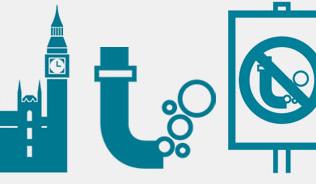To mark 20 years of SocEnv, we spoke to Will Pope, one of its founders, to reflect on the progress made since then.
What has been the impact of SocEnv on your career?
I’m not sure I have a single answer to this, I think there might be a couple at least. I was already a CEO of an environmental consultancy and professionally qualified when SocEnv received its Royal Charter. I had the pleasure and the privilege of collecting the parchment Charter itself from the House of Lords (and take the enormous thing home on the train!), as one of the founders. It didn’t exist prior to that, or in the early part of my career. However, I think that there are at least two areas where SocEnv has definitely had an impact.
 Firstly, I hope it has had an impact for myself and everybody else on the SocEnv Professional Registers. There is an increase in visibility in being professionally registered, and in recognition and respect. Designations such as Chartered Environmentalist places individuals optimally to support the betterment of the profession and the environment. Twenty years ago, the environment wasn’t as widely recognised as it is today as an important social, economic and wider health issue. It has been a positive experience awarding Chartership to over 10,000 people in those 20 years, with over 8,000 on the register currently. This is good for the profession, and it has a positive impact for all the professionals involved, as well as being beneficial for the environment and society.
Firstly, I hope it has had an impact for myself and everybody else on the SocEnv Professional Registers. There is an increase in visibility in being professionally registered, and in recognition and respect. Designations such as Chartered Environmentalist places individuals optimally to support the betterment of the profession and the environment. Twenty years ago, the environment wasn’t as widely recognised as it is today as an important social, economic and wider health issue. It has been a positive experience awarding Chartership to over 10,000 people in those 20 years, with over 8,000 on the register currently. This is good for the profession, and it has a positive impact for all the professionals involved, as well as being beneficial for the environment and society.
Secondly, the 20+ years that I have been involved as a board member and chair have seen a positive impact on partnership working. It was at times a difficult chairing job, especially in the very early days, when we were bringing together people from different professional bodies, with different specialisms who weren’t used to working in partnership with each other. At times, they often didn’t really want to work in partnership at all. But we knew that having these bodies working together productively in partnership was a good thing, and would lead to a better professional outcome. Learning how to manage articulate, experienced people and complex boards – at times upwards of 30 people, all with different strongly held views – has been a useful professional experience for me personally.
We’ve now shown how helpful it is to work in partnership, and this is exemplified in the further development of SocEnv through the 2010s and 2020s, and indeed in the current work of the Environmental Policy Forum (EPF), which we subsequently established to include additional partners who weren’t necessarily SocEnv members. SocEnv provides the back office and the Secretariat for the EPF, which I have had the honour to chair, and this has encouraged great cross-professional team working and collaboration.
Was it difficult to bring people together due to their differing areas of expertise?
I’m sure there was an element of that at times – and certainly 20 years ago it was more of a challenge to help people understand how complex and wide the environmental agenda really is, when there are so many specialty professions making up the professional environmental landscape. There was perhaps also an under-appreciation, in the early days, of the benefits that can accrue from working together. Yet I think the most common early challenge was competition, or the fear of competition. All professional bodies have to remain financially viable to stay in existence, and there was a genuine concern at times that certain bodies might lose members, suffer financially, or not get recognition due to dilution. I think it's fair to say that the work that SocEnv and the EPF has delivered in recent years, which they continue to deliver today, has been important: particularly in the skills agenda, the future of the environmental profession, and in influencing government policy. This has shown that the value of working together in partnership far outweighs the concerns that people used to have about this approach.
How do you see SocEnv evolving in the future?
I’d like to think that people seeing the benefits of working together will be a self-fulfilling prophecy. The IES is an example of that, because of the contributions it makes across the board, and the partners it works with both in SocEnv and the EPF. Professional bodies still have to understand where their individual areas of professional expertise and the boundaries lie, but there is an increasing appreciation that we’re stronger together, so I hope this continues and will even accelerate.
Do you think the CEnv chartership still has the same value as it did when SocEnv started out?
Within the profession, yes, without doubt. Particularly in the UK, having chartered status definitely still helps careers. This is not just in the environmental sector: chartership works for engineers, scientists, and for those in very different professions like accountancy or law. The chartered status is not easy to get, and it is therefore valued by colleagues, employers, clients, and indeed by those with whom we work in the profession, once it has been achieved. There is still some way to go with getting an internationally recognised qualification, since professional qualifications such as chartership are not automatically recognised across the world. Developing this area this would be a great piece of work to focus on over the next 10 years.
In your view, what is the main benefit for anyone considering getting chartered, or for any organisations interested in joining SocEnv?
Appreciation, respect, credibility: in professional and personal terms, and in terms of career development. By becoming a member of a body able to award chartered status, or by becoming chartered yourself, you can gain credibility among your peers. To get the recognition of professional colleagues is not easy, but it is very achievable by bright, thoughtful, committed and well-intentioned professionals. In my view, the journey starts on 'day one' of a career. Being chartered helps to maintain this drive, and helps you keep focused on delivering.
Does it feel as though 20 years have passed?
The first meetings we held were in a restaurant in north London, to discuss what eventually turned into SocEnv, after a number of developments along the way. A few of us realised right at the beginning that we were stronger working together, that the whole was greater than the sum of the parts: and that the environmental profession needed and deserved recognition on a par with other professions. That process started in 1999, which means that it has actually spanned four decades now. In one way it seems like yesterday, and another way it feels like a long time ago – the latter because we have made a lot of progress, which has been hard fought, and hard won. My own personal philosophy back then, as well as now, is that I will not be satisfied until being a professional environmentalist is as normal as being a medical doctor, dentist, lawyer or accountant. In my view, the big win will be when it is generally accepted by the population as a whole that it is a perfectly normal profession in our society. In my ideal world, I think we will have 'won' when you can walk down a high street and see a building surveyor’s office, a GP surgery, an accountant’s office, then an environmentalist’s office. If and when that is an everyday occurrence, which it isn’t yet, we will have achieved the normalisation that is required in society to deliver sustainability. We’re a lot further on than we were in the 90s, but we still have a long way to go. The work is only just starting in truth: we have indeed made progress, but we’ve got to keep hitting the road hard.
Learn more about the history of SocEnv
Apply for Chartered Environmentalist
Apply for Registered Environmental Practitioner
Apply for Registered Environmental Technician





